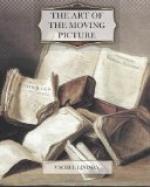Ani knocks at many doors in the underworld. Monstrous gatekeepers are squatting on their haunches with huge knives to slice him if he cannot remember their names or give the right password, or by spells the priests have taught him, convince the sentinels that he is Osiris himself. To further the illusion the name of Osiris is inscribed on his breast. While he is passing these perils his little wife is looking on by a sort of clairvoyant sympathy, though she is still alive. She is depicted mourning him and embracing his mummy on earth at the same time she accompanies him through the shadows.
Ani ploughs and sows and reaps in the fields of the underworld. He is carried past a dreadful place on the back of the cow Hathor. After as many adventures as Browning’s Childe Roland he steps into the judgment-hall of the gods. They sit in majestic rows. He makes the proper sacrifices, and advances to the scales of justice. There he sees his own heart weighed against the ostrich-feather of Truth, by the jackal-god Anubis, who has already presided at his embalming. His own soul, in the form of a human-headed hawk, watches the ceremony. His ghost, which is another entity, looks through the door with his little wife. Both of them watch with tense anxiety. The fate of every phase of his personality depends upon the purity of his heart.
Lying in wait behind Anubis is a monster, part crocodile, part lion, part hippopotamus. This terror will eat the heart of Ani if it is found corrupt. At last he is declared justified. Thoth, the ibis-headed God of Writing, records the verdict on his tablet. The justified Ani moves on past the baffled devourer, with the mystic presence of his little wife rejoicing at his side. They go to the awful court of Osiris. She makes sacrifice with him there. The God of the Dead is indeed a strange deity, a seated semi-animated mummy, with all the appurtenances of royalty, and with the four sons of Horus on a lotus before him, and his two wives, Isis and Nephthys, standing behind his throne with their hands on his shoulders.
The justified soul now boards the boat in which the sun rides as it journeys through the night. He rises a glorious boatman in the morning, working an oar to speed the craft through the high ocean of the noon sky. Henceforth he makes the eternal round with the sun. Therefore in Ancient Egypt the roll was called, not the Book of the Dead, but The Chapters on Coming Forth by Day.
This book on motion pictures does not profess to be an expert treatise on Egyptology as well. The learned folk are welcome to amend the modernisms that have crept into it. But the fact remains that something like this story in one form or another held Egypt spell-bound for many hundred years. It was the force behind every mummification. It was the reason for the whole Egyptian system of life, death, and entombment, for the man not embalmed could not make the journey. So the explorer finds the Egyptian with a roll of this papyrus as a guide-book on his mummy breast. The soul needed to return for refreshment periodically to the stone chamber, and the mummy mutilated or destroyed could not entertain the guest. Egypt cried out through thousands of years for the ultimate resurrection of the whole man, his coming forth by day.




